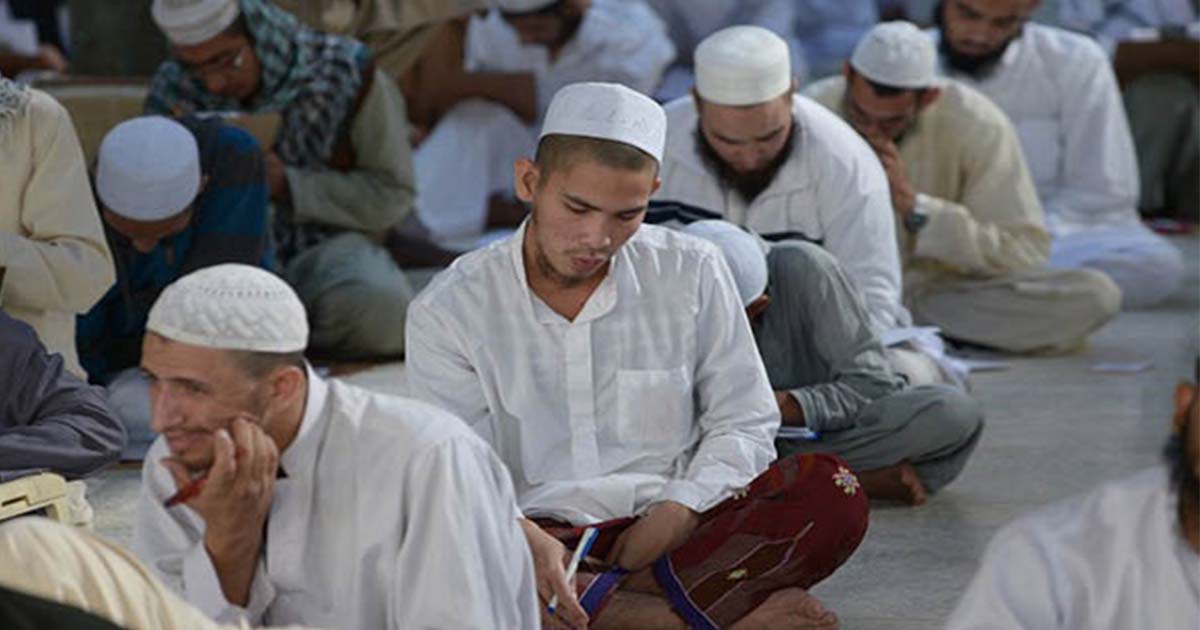The Ministry of Federal Education and Professional Training are likely initiate a country-wide madrassah registration process from the first week of March 2020. This was long expected as Prime Minister Imran Khan had promised to reform Pakistan’s national discourse on education.
Education Ministry to register madrassahs in March https://t.co/SJsTLaKErH pic.twitter.com/Gf6imC2fFX
— Post of Asia (@post_asia) February 20, 2020
According to the official sources, so far, no madrassah has been registered/affiliated with the ministry, while all necessary arrangements have been finalised in that regard. However, the Directorate General of Religious Education has also been established in the federal capital along-with its country-wide 16 regional offices.
The staff has been posted in these regional offices from the National Commission for Human Development (NCHD) and Basic Education Community Schools (BECS) on an attachment basis.
Printing Corporation of Pakistan has printed the registration form as earlier agreed by the Ministry of Federal Education and Professional Training and Ittehad Tanzeemat-ul-Madaris Pakistan (ITMP).
It is worth noting that the federal government has announced to introduce the ‘national curriculum‘ for all the institutes including seminaries. Federal Minister for Education Shafqat Mehmood said that his ministry is preparing the ‘national’ syllabus after taking all the curriculums around the world into its consideration. Therefore, “those who think the curriculum of O/A levels is the standard, should know that our prepared curriculum will be a top-level one.”
On this #WorldEducationDay, I'd like to congratulate our team for introducing Reforms in all Departments for the welfare of teachers & towards quality education
Education is PTI Govt's top priority and IA we will ensure that no child is left without access to quality education. pic.twitter.com/RB6AhGCKl4
— Usman Buzdar (@UsmanAKBuzdar) January 24, 2020
Moreover, for the mainstreaming of religious seminaries into the federal system of education, the minister announced that his ministry will open 12 offices across the country, and old government officials, as well as new people, will be recruited in this regard. The budget has also been approved for this project, he added.
“Books of war”
Nadeem Farooq Paracha recently noted in an article that the books which promoted selective interpretation of Islam were neither written nor published in Pakistan. “An active member of one of the charity organisations about the books (Urdu textbooks that were being taught to students between the ages of eight and 12.), he told me the tomes were not originally published in Pakistan. To my astonishment, the books in question were actually reprints of textbooks that were first authored and printed in the US in the early and mid-1980s. They were then shipped to Pakistan, where they were distributed to various schools and madressahs countrywide and to madressahs and schools in the villages of Afghanistan near the Pak-Afghan border,” he wrote.
A must read article: Books of War
Nadeem F. Paracha describes how US used books to create holy war against soviet union in 1980s in Afghanistan.
Germany also did that in 1914 against Britain and its allies by circulating jihadist content in Istanbul.#PakistanArmy#AshrafGhani pic.twitter.com/7nAsmUYpNs— Nisar Akber (@NisaarAkber) February 19, 2020
He further states that “this was done during the anti-Soviet insurgency in Afghanistan between 1980 and 1988. Afghan and Arab insurgents (the mujahideen) were stationed in Pakistan and sustained by financial aid and support from the US and Saudi Arabia”.
Read More: Handling school education and economy: Lessons from Finland – II
Moreover, in the March 23, 2002 issue of the Washington Post, Joe Stephens and David B. Ottaway write that, during the insurgency, Ronald Reagan’s government spent millions on the printing of textbooks (in Pashto, Dari and Urdu) “filled with violent images and militant teachings, as part of covert attempts to spur resistance to the Soviet occupation.” These books were sent to Pakistan with the billions of dollars’ worth of “aid” that Pakistan received from the US to facilitate the insurgency.
Changes in Curriculum
Recently, in a major development, Muttahida Ulema Board Punjab has recommended a ban on books authored by Tehreek-e-Labbaik Pakistan (TLP) and Ahmadi leaders.
According to local media reports, Muttahida Ulema Board Punjab Chairman Hafiz Muhammad Tahir Mehmood Ashrafi said that the representatives of Muttahida Ulema Board Punjab decided unanimously on Monday to ban five books, including manifesto of banned Sipah-e-Sahaba Pakistan, monthly journal of Pir Afzal Qadri, ‘Awaz Ahl-e-Sunnah’, ‘Kashtiy-e-Noah’ and other five books collectively for having hateful and objectionable content.
Mr. Ashrafi also said that Muttahida Ulema Board Punjab has always played its due role in countering terrorism and menace of extremism from Pakistan.
Read More: Hafiz Pasha: PTI is pushing Pakistan into abject poverty
He also informed the media that the central board meeting of Muttahida Ulema Board Punjab has decided to ban a book of Pir Afzal Qadri ‘Monthly Awaz-e-Ahl-e-Sunnah’, ‘Kashti-e-Nuh’ of Mirza Ghulam Ahmed Qadyani. The meeting further recommended filing case against the publisher of this book under section 295/C.
Pir Afzal Qadri is former chief of Tehreek-i-Labbaik Ya Rasool Allah (TLYRA) and a firebrand speaker who along with Khadim Hussain Rizvi was taken into custody for using abusive language against the judiciary and threatening judges of the superior courts after the verdict of Ms. Asia Bibi.
But the bigger question is will the government be able to reform seminaries since some political parties in Pakistan enjoy unconditional submission of students studying there.














